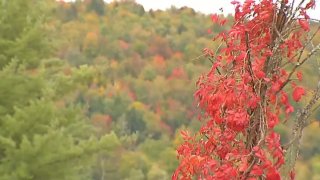
Pumpkin lattes, sweater weather and leaf-peeping are right around the corner.
Fall is just over 30 days away, and the forecast for foliage has begun. However, this year's drought will be the biggest factor leading to this season’s timing and intensity of said foliage.
WATCH ANYTIME FOR FREE
>Stream NBC10 Boston news for free, 24/7, wherever you are. |
Back in winter, the snow pack was confined to the crown of Maine, the White Mountains and northern Vermont. When we switched to spring, this snow melted slowly up north, but southern new England dealt with dry soils quickly. Heat waves and a prolonged dry weather pattern came after — the lack of rain has set us up for severe to extreme drought that now stretches from the coast of Maine through northwestern Connecticut.
The need for rain is real, but when it comes to foliage, both precipitation and temperatures must be put into perspective. With cooler the temperatures, chlorophyll found in trees' leaves break up. This leaves other chemicals that cause the colors to change. Bright colors are more likely when late summer tends to be dry and autumn has sunny days with cool nights.
Get updates on what's happening in Boston to your inbox. Sign up for our >News Headlines newsletter.
Looking at the weather forecast, our weather is trending to end the month of August with above-average highs, entering the month of September with a similar pattern. Our precipitation chances, however, are still trending on near average.
In northern New England, which tends to be the most popular tourist destination for foliage, things are looking better. Forecasts are pointing to brighter colors across Vermont through Northern Maine.
As for timing, northern New England will likely see foliage peaking at its usual time, by late September. However, the farther south you go, the slower it might be. It's possible that we see foliage lingering through November across the southern states.

